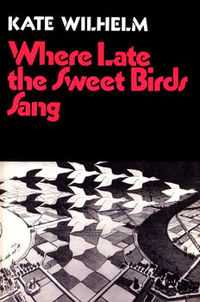Where Late the Sweet Birds Sang
|
Cover of first edition (hardcover) | |
| Author | Kate Wilhelm |
|---|---|
| Cover artist | M. C. Escher |
| Country | United States |
| Language | English |
| Genre | Science fiction novel |
| Publisher | Harper & Row |
Publication date | 1976 |
| Media type | Print (Hardcover & Paperback) |
| Pages | 207 pp |
| ISBN | 0-06-014654-0 |
| OCLC | 1529187 |
| 813/.5/4 | |
| LC Class | PZ4.W678 Wh PS3573.I434 |
Where Late the Sweet Birds Sang is a science fiction novel by Kate Wilhelm, published in 1976. Parts of it appeared in Orbit 15 in 1974. It was the recipient of the Hugo Award for Best Novel in 1977,[1] and was nominated for the Nebula Award for Best Novel in 1976.[2] The title of the book is a quotation from William Shakespeare's Sonnet 73.
Plot summary
Massive environmental changes and global disease, attributed to large-scale pollution, cause the collapse of civilization around the world. One large, well-to-do extended family sets up an isolated community in an attempt to survive the coming catastrophe. However, as the death toll mounts, due to a disease and other causes, they discover that they are universally infertile. After discovering that the infertility might be reversed after multiple generations of cloning, the family begins cloning themselves to survive. It is assumed that after enough generations of clones have been created and fertility restored, that sexual reproduction will be become the norm again. However, when the clones come of-age, they reject the idea of sexual reproduction in favor of further cloning. The original members of the community, too old and outnumbered by the clones to resist, are forced to accept the new social order.
As time passes, the new generations of clones eliminate the ideas of individuality from their social structure. Since they are cloned in groups of 4-10 individuals, they grow to depend on each other enormously and lose their sense of individuality, gaining in return an empathic sense of their clones. One woman, after being separated from her clones while on an expedition to find materials in the ruins of nearby cities, regains her sense of individuality; she goes on to have a child, Mark, with a man who was also on the expedition. The two are expelled from the community when Mark is discovered, though Mark himself is not. As Mark grows up, he discovers that his uniqueness gives him individuality and the ability to live away from the community, something which the clones are now unable to do. The leaders of the community realize that the latest generations of clones are losing all sense of creativity and are unable to come up with new solutions to problems; simultaneously they see that the growing lack of high-technology equipment will result in the community losing the ability to continue with the cloning process.
Mark, now a teenager, also sees this problem, and rather than lead an expedition to find more high-technology equipment, he leads a group of people that he has persuaded to his cause to leave the community and start over with a lower, more sustainable level of technology. In the ending to the book, he returns to the community 20 years later to discover that in the wake of a disaster the non-creative clones were unable to adapt, and the village has been destroyed. He then returns to his community, where all of the children and younger generations have been produced naturally and continue to thrive.
The novel makes a passing reference to global cooling caused by human pollution, a prominent depiction of the future in the 1960s and '70s:
The winters were getting colder, starting earlier, lasting longer, with more snows than he could remember from childhood. As soon as man stopped adding his megatons of filth to the atmosphere each day, he thought, the atmosphere had reverted to what it must have been long ago, moister weather summer and winter, more stars than he had ever seen before, and more, it seemed, each night than the night before: the sky a clear, endless blue by day, velvet blue-black at night with blazing stars that modern man had never seen.
References
- ↑ "1977 Hugo Awards". Retrieved 21 April 2015.
- ↑ "1977 Nebula Awards". The Locus Index to SF Awards. Retrieved 21 April 2015.
| ||||||||||
| ||||||||||
